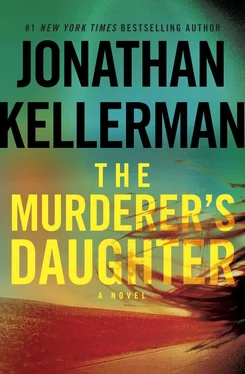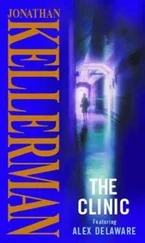That sounded pitifully simple. Grace said, “There’s still the matter of money.”
“The old moochery thing? Don’t give it a thought.”
Grace didn’t reply.
Sophie said, “Why don’t we cross that bridge when we come to it?”
“All right,” said Grace. “I appreciate your setting up contingencies in both places. Could I have a couple of days to think?”
“I’d expect no less than careful contemplation from you,” said Malcolm.
Grace finished her soft-boiled egg.
She’d let the time pass. Ask for a third day in order to appear contemplative.
But she’d already made up her mind.
Grace stopped in Monterey, finding a casual fish restaurant where, surrounded by families and older couples, she fueled up on grilled salmon, steak fries, and a pot of serious coffee. Thirty-five minutes later, she was back on the road.
Refreshed, purposeful, spotting no cops, she sped.
She pulled into Berkeley just before nine p.m., encountering clear, starlit skies and plenty of street life. A welcome sense of familiarity took hold, though she hadn’t been here in years. But back in her twenties, she had flown up fairly frequently, delivering papers, co-authored with Malcolm, at oh-so-earnest symposia.
He had no professional need to do any of that but indulged in occasional scholarly gregariousness. Grace’s purpose had been hanging out with him. She recalled the inevitable after-parties with a smile. Standing on the sidelines, glass of white wine in hand, as Malcolm regaled a generally sour lot of academicians with anecdotes plucked from a life lived well.
He’d been so different from them, a redwood among dry weeds.
In her free time, Grace had explored the university town, always finding it an interesting study in pretense. Berkeley was blessed with gorgeous, rolling topography, bordered by hills where trees and shrubs thrived with little care, graced with stunning views of ocean and bay and bridge, everything centered on the vast emerald spread of a venerable campus.
High-end restaurants abounded — Shattuck Avenue’s sobriquet was the Gourmet Ghetto. And neighborhoods like Berkeley Hills and Claremont sported grand old houses dating from an age when Northern California was the financial hub of the state. Despite all that, the city seemed to cultivate shabbiness, like one of those old-money dowagers pretending they hadn’t lucked into a life of privilege.
Being overrun with students and hippie-anarchist-nihilist alums who refused to leave didn’t help. Nor did a political climate that thrived on class envy and political correctness and welcomed the homeless without elevating them.
Where Berkeley’s unique ethos really hit you was when you got behind the wheel. Five minutes after rolling into town, Grace had to brake suddenly to avoid pulverizing a pedestrian who leaped off the sidewalk into nocturnal traffic.
A kid, probably a sophomore, long hair streaming above his chiseled spoiled-brat face as he grinned and flipped her off and continued sprinting straight into the next lane of autos. More sudden stops, more one-fingered salutes.
Two blocks later, two girls did the same thing.
I walk, therefore I am virtuous and own the streets and fuck you gas guzzlers!
In Berkeley, even basic locomotion was a political statement.
Grace continued to explore from behind the wheel. Even more street life on the main drags of Telegraph and University. She veered into quieter nocturnal territory, cruising toward the building on Center Street where Roger Wetter Senior and his adopted son had established their headquarters years ago.
Too dark to make out details from across the street. The six-story structure faced a flat, sparse park ringed with trees but scruffy at the center. Beyond the grass stood the dark bulk of Berkeley High.
Seeing the school reminded Grace of Roger Wetter Senior’s enlistment of young thugs to intimidate elderly earthquake victims. Had he found his troops right here?
Something else struck her: Knife-wielding Mr. Benn would’ve been a young man back then. The likelihood he’d been part of the scam seemed stronger.
As she idled, a figure skulking through the park caught her eye. Stooped, emaciated man, lurching drunkenly, holding something in a paper bag. She drove on, hung a U, parked close to the building.
Six flat stories of characterless night-gray stucco. Ragged black holes in place of doors and windows, the roof mostly gone, rafters tilting upward like splintered chicken bones.
Blocking entry was a chain-link fence. Behind the diamond-shaped holes of the barrier Grace made out an earthmoving machine.
A white placard on the fence was too far to be legible. Movement to her left made her turn quickly. The lurching guy was getting closer. She prepared to leave but he headed up the block, stumbling drunkenly.
Grace hopped out of her SUV and examined the sign. Demolition notice, some sort of government-funded project.
If Alamo Adjustments still existed, she’d have to look elsewhere to find it.
Or maybe she wouldn’t. Because it was Mr. Venom she really wanted and if he still owned the structure and dropped by to oversee the government-funded transformation of his property...
Shuffling sounds behind her. Hand in her bag, she rotated carefully.
The lurching figure from the park was back, approaching her, hand out.
Old, bent-over guy reeking of booze. She gave him a buck and he said, “Bless you,” and moved on.
She continued driving around, taking her time as she searched for appropriate lodging, was intrigued by a drab-looking place smack in the middle of the University Avenue bustle. Arching green neon letters crowned the entry.
OLD HOTEL
No accommodation of the youth culture? Then she edged closer to the sign and saw the out-of-commission S.
The Olds Hotel occupied a mixed-use building with storefronts at street level and rooms above. A black-painted arrow directing the weary traveler to the top of a grimy flight of concrete stairs.
Grace circled the block. The Olds offered an outdoor parking lot in back, mostly empty now and guarded by a flimsy wooden yardarm. Entry was simple: Push a button and drive through. Exit required a token from the management.
Grace returned to the front of the hotel and examined the businesses below. Two stores to the left, a vintage-clothing store might be of use. Not so the cut-rate hair salon next door.
To the right of the hotel entrance was perfection: a photocopy/self-print outlet advertising discounts for theses and dissertations. More to the point: The place was open twenty-four hours a day.
Grace parked illegally and zipped in. Ignored by a student-aged boy engrossed in Game of Thrones, she printed herself a new batch of business cards on cheaper paper than those proffered by M. S. Bluestone-Muller, Security Consultant.
S. M. Muller, Ed.D.
Educational Consultant
claimed a Boston number that would lead to a long-defunct pay phone in the lobby of the main branch of the Cambridge public library. Back in her student days, Grace had used the booth to phone a boy at Emerson, a would-be theater director whom she’d met in a dive bar. He’d swallowed her story about being an L.A.-based aspiring actress and she’d slept with him three times, barely remembered his face. But the booth’s phone number remained etched in her memory. Funny the things you held on to.
Returning to the Escape, she drove around to the rear of the Olds Hotel and toted her suitcase up the hotel’s rear staircase, also concrete and every bit as grungy.
At the top was a musty-smelling lime-green hallway lined with doors painted to match and carpeted in wrinkled khaki-colored polyester.
Читать дальше












